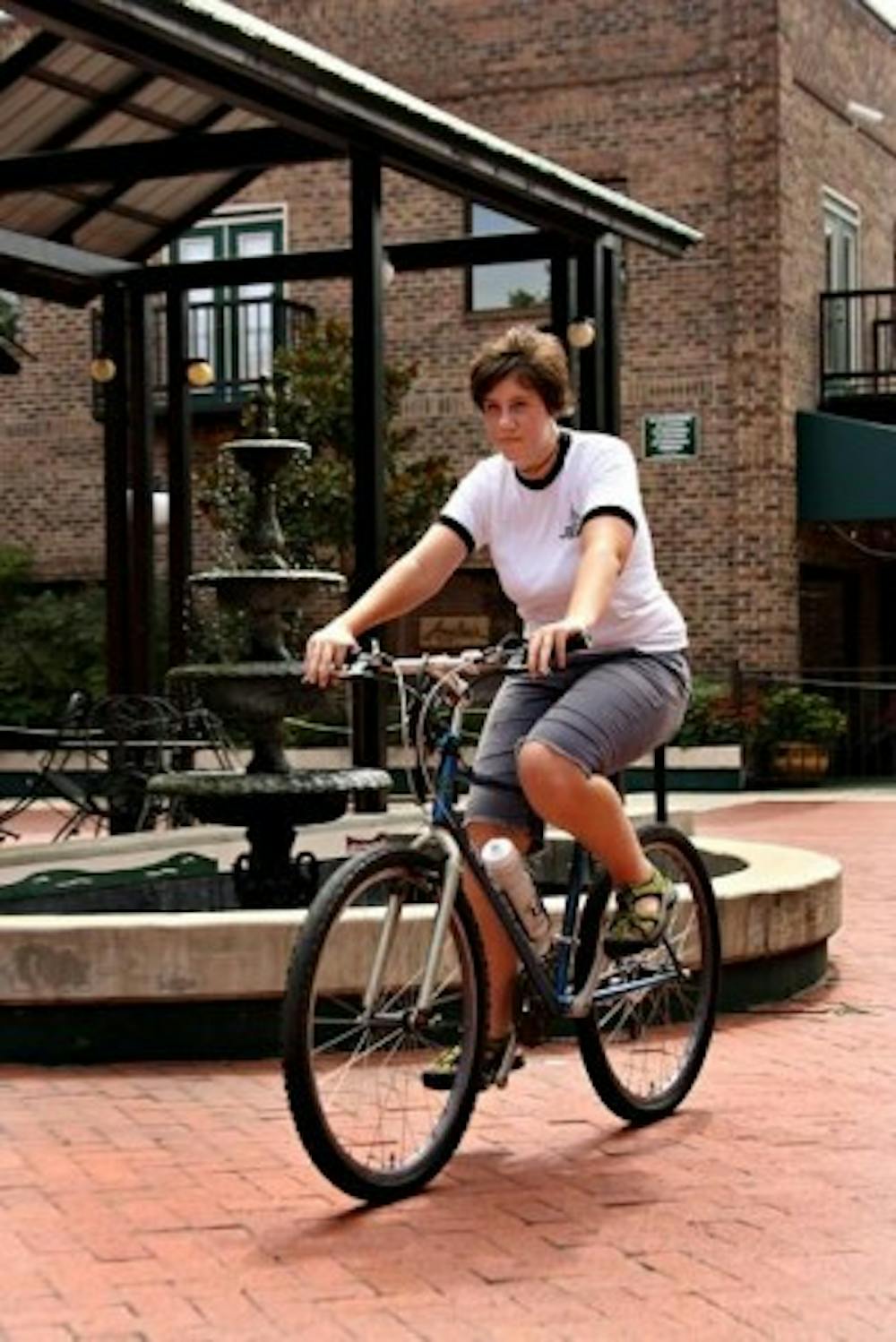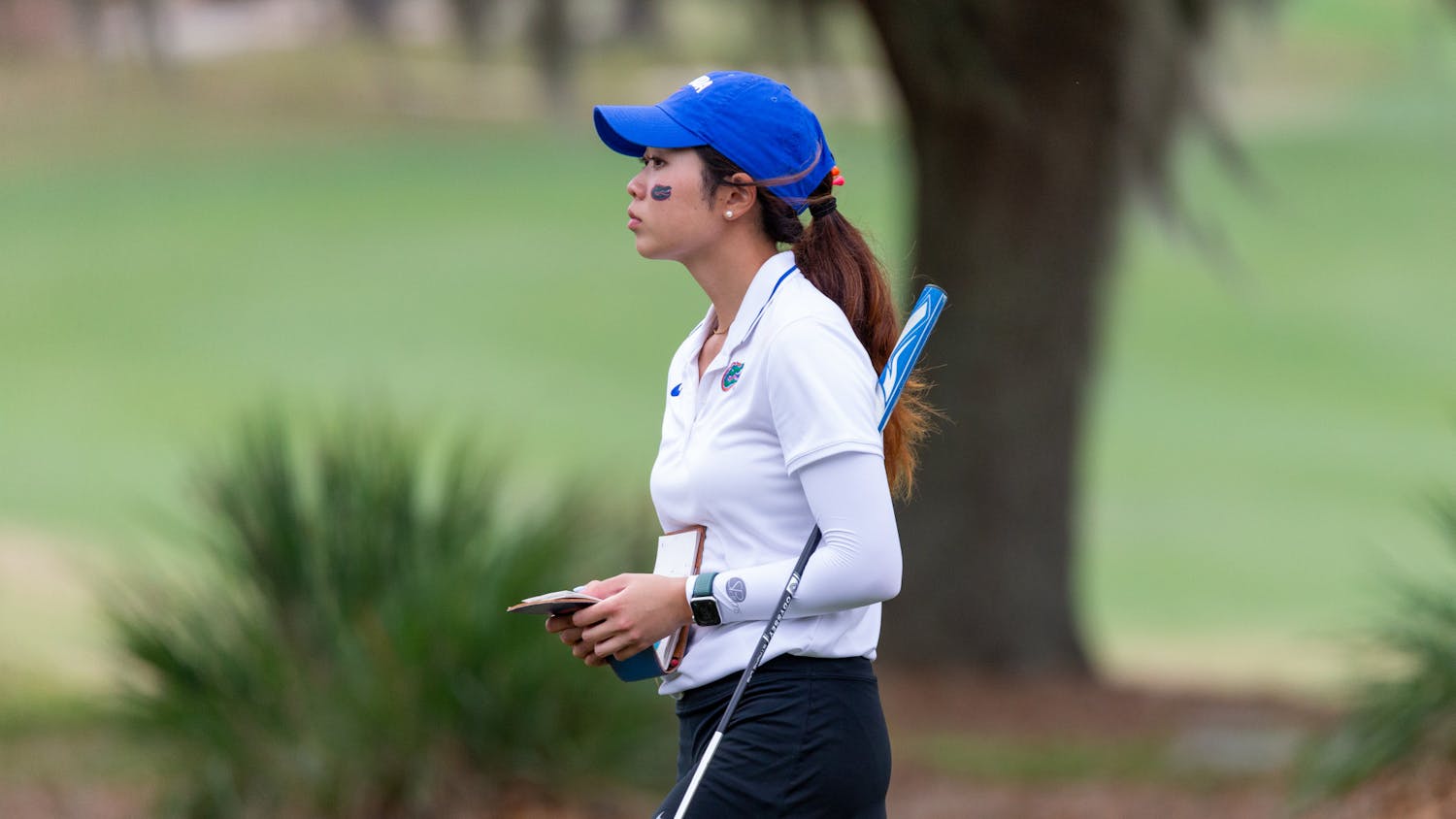This story is the second in a three-part series on the trend of "going green."
Vyki Englert cycles, drinks from a reusable water bottle, buys locally and brings her own shopping bag. She lights her place with compact fluorescent bulbs, turns off the air conditioning and reduces toilet flushing.
Englert, a Gainesville resident, is part of the growing group of people who have made the commitment to adopt environmentally friendly, or green, behaviors in every aspect of their lives.
As "going green" has become more popular worldwide, so has enthusiasm for the movement among residents and businesses in Gainesville.
For Englert, the green lifestyle offers more than bandwagon appeal.
"Day to day, the choices I make are guided by a love of the nature and people around me," she said.
Green Links
Englert's volunteering habits, such as working at The Kickstand, a bicycle repair shop, match up with the environmentally conscious way she lives.
"The earth we live on is finite," Englert said. "To live a sustainable lifestyle is to acknowledge and embrace our responsibility as stewards of this earth."
Baby got trash
Alachua County is serious. Serious about reducing waste, serious about reusing materials and serious about recycling.
Sally Palmi, solid waste and recycling coordinator for the Alachua County Division of Waste Management, said both the city and the county have commercial recycling ordinances that require businesses to recycle.
"What we're doing in the city and the county right now is going to our businesses, apartment complexes and helping them understand the meaning of our ordinance and then also helping them to establish workable programs that are going to be successful," Palmi said.
Compared with the other 66 counties in Florida, Alachua County ranks in the top 15 for most waste recycled, she said.
"We're a pretty green community," she said. "People are always looking for ways to do better."
Apartment complexes are areas that could use improvement, she said.
Many places don't have easy access to recycling, so residents are often unaware or unmotivated to recycle.
"We want to reduce first, reuse what we can and recycle whatever is left over," Palmi said.
Waste Management educates the public about the three R's through programs such as the S.M.A.R.T. shopper, which teaches consumers to buy in bulk and buy recycled products.
In another program, Waste Watcher, a recycling superhero, teaches children to "Embrace Zero Waste," she said.
"We have to realize that our world is made up of limited resources," Palmi said. "And our population is growing exponentially in the world, and our resources are not infinite."
Electric green
Gainesville residents can now do more to be green than unplugging appliances or turning off lights.
They can support alternative energy, such as solar energy and energy from the methane produced when burning trash.
Katie Weitekamp, spokeswoman for Gainesville Regional Utilities, said the company has set alternative green energy as a priority.
"Gainesville City Commission is our board of directors," Weitekamp said. "[They direct] us to pursue not only maximum energy efficiency but also alternatives, including solar."
Although it is expensive for homeowners to convert to solar energy, so far 36 solar panel systems exist in Gainesville and 40,000 watts of solar energy have been produced for the few homes and businesses that have invested, she said.
"Not everyone on the block will be able to afford solar panels," she said.
But according to GRU's Web site, alternative energy benefits more than just those who pay for it.
In 2004 GRU kicked off its gas energy project, which burns trash to produce methane that is used as an energy souce.
So far, the project has produced 11,136 mega watt hours of energy, Weitekamp said.
That's enough to power 976 homes for one year, she added.
Green will get you there
Green crosses into transportation as well. Whether walking, cycling or riding the bus, there are greener ways to get around.
Theresa Harrison, Regional Transit System marketing and communications specialist, said riding the bus provides people an alternative transportation option.
The transit system's average daily passenger count ranges from 20,000 in the summer to 50,000 in the fall and spring semesters.
Each year public transportation use in the U.S. saves 1.4 billion gallons of gasoline, she said.
"In our community there are 42 seats on a bus. If that bus is full of just seated passengers, that is 42 cars that are potentially off the road," Harrison said.
In a society that relies on cars, the switch to alternate transportation is moving slowly.
Palmi said Alachua County Public Works currently has more than 25 hybrid vehicles and two electric vehicles, and all diesel equipment is run on bio-diesel.
Weitekamp said GRU currently has nine hybrid cars, out of a fleet of 340 cars, trucks and SUVs.
Cycling is an energy efficient, nonpolluting way to travel, but takes time out of busy schedules.
Englert sold her car and now uses her bike as her primary vehicle.
Green in Gainesville
Incorporating green into a lifestyle can mean something as small as carrying a reusable bag to the grocery store, or it can extend into every aspect of a person's life.
Liberty Phoenix, owner of Indigo, a green store in Gainesville, drives a hybrid car, buys cleaning supplies from her store, eats vegan and remodels her home with green products.
"I'm not extreme," Phoenix said. "I don't carpool. I don't ride my bike. I live out of town. There are definitely things that are, like, not feasible for my lifestyle."
A lot of people may jumping on a bandwagon, but now is the time to get on, she said.
"My philosophy is the more, the merrier," Phoenix said. "Even if you're doing it to make money and you want to be green only because of that, the whole point is that you're doing something green."
Her store offers the community a place to become educated about green.
The free, or inexpensive, classes offered every Saturday teach patrons how to incorporate green products into their own lives, such as making a rain barrel for a source of renewable water.
Steve Nichtberger, owner of Flashbacks Recycled Fashions, is not sold on the whole green trend.
He said when his store first opened in 1986, it was considered as a Salvation Army.
Students would bring in clothes, but never buy them, he said.
"People for years, especially when we started, used to come in here and say, 'Ew, I don't wear used clothes,'" Nichtberger said. "But I used to say to people, 'you don't sleep in hotel beds? You don't eat of off restaurant forks? They are all used.'"
A washing machine can separate you and every bit of the past of that garment, he said.
"It wasn't until 1990, the 20th anniversary of Earth Day that recycled became the 'it' thing," Nichtberger said. "And then all of a sudden we were hip and happening."
He believes the popularity of going green is being fueled by the economy.
People get paid the same amount of money, but prices are increasing, so since pocketbooks are being hit hard, green is suddenly a hot topic, he said.
"The whole idea of living green, that to me is like another one of these fads," he said. "To me I have always lived in harmony with my environment."
Whether or not he agrees with the buzzword green, he said it is making people aware.
The most we can look forward to is that this generation will start living consciously, so in 10 years we'll all be better off, he said.






